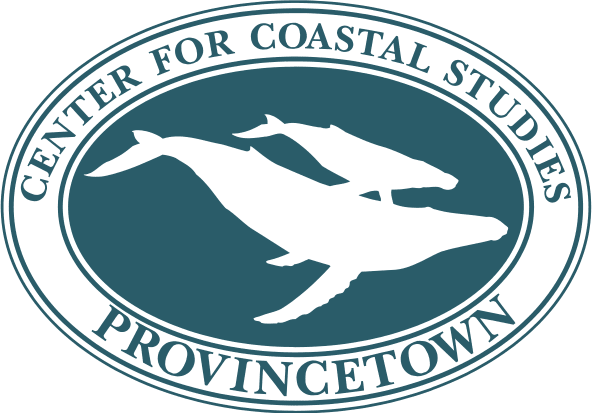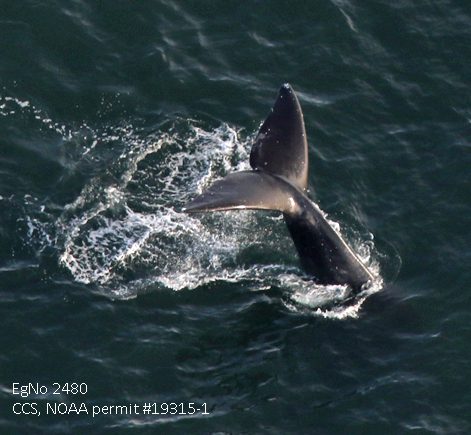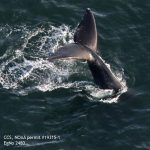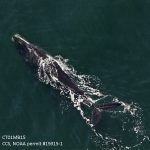On Monday, January 6, the Center for Coastal Studies (CCS) aerial surveillance team spotted two endangered North Atlantic right whales in Cape Cod Bay, the first right whale sightings in the bay in 2020.
The unique markings on the whales’ bodies enabled the CCS team to identify them as right whale #2480, an adult of unknown sex that was first documented in 1994, and #4550, a juvenile female born in 2015. Both whales were last seen in Cape Cod Bay during the 2018-2019 right whale season.
North Atlantic right whales, one of the rarest of the world’s large mammals, visit Cape Cod Bay every winter and spring to feed on rich blooms of microscopic zooplankton. Between December 2018 and May 2019 CCS researchers identified 268 individual whales in the Bay – more than half of the current population of just 400.
CCS, in collaboration with the Massachusetts Division of Marine Fisheries, has surveyed Cape Cod Bay annually since 1998, monitoring the presence and condition of the whales between the months of January and May.
The loss of at least 20 whales to ship strike, entanglement and other as-yet unidentified causes, between 2017 and 2018 prompted CCS to launch the Right Whale Emergency Initiative to better protect the remnant population. The initiative broadened the aerial survey area to encompass recently designated right whale Critical Habitat on Jeffreys Ledge (off the coast of Massachusetts and New Hampshire), and extended the survey season by three months. This year, with financial support from local businesses, foundations and individuals, CCS commenced aerial surveys in October 2019 and will continue through May 2020.
This increased effort improves the capacity for CCS to find and free entangled right whales and expands the ability of federal and state agencies to protect the remnant population: Real-time sighting reports from the CCS survey team allow state and federal agencies to determine when and where to establish Dynamic Management Areas (DMA) and to put out a notice to mariners and ask for a voluntary reduction in the speed of all vessels transiting the DMA. In December 2019, a DMA was issued for waters south of Nantucket after the CCS team confirmed the presence of fourteen right whales in that area.
Dr. Charles “Stormy” Mayo, Senior Scientist at CCS said “As a result of the Right Whale Emergency Initiative we now know that whales enter the critically important Cape Cod Bay area earlier than previously thought, information important to the effort to protect the species.”
He continued “At least thirty right whale mortalities have occurred during the last three years, and only twelve calves have been born, so the population is under tremendous pressure. The loss of even one breeding female is catastrophic. If we don’t step up our efforts to protect these incredibly rare animals they could become functionally extinct in our lifetime.”
Updates from the CCS right whale researchers are posted HERE.
Members of the public are reminded that it is illegal for watercraft or aircraft of any kind to approach within 500 yards (1500 feet) of a North Atlantic right whale without a federal research permit.
CCS right whale research and response operations are conducted in partnership with the Massachusetts Division of Marine Fisheries and NOAA under federal permits issued by the National Marine Fisheries Service. Support also comes from the Massachusetts Environmental Trust, the Disney Conservation Fund, and contributions from other foundations, businesses and CCS supporters.
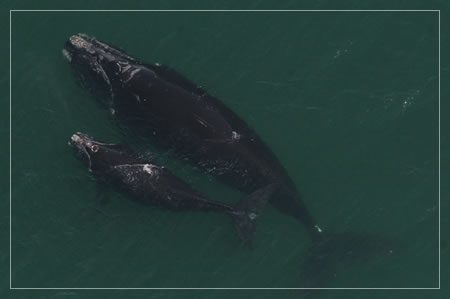
Our Work
Humpback Whale Research
Right Whale Research
Marine Animal Entanglement Response
Marine Geology Department
Water Quality Monitoring Program
Marine Fisheries Research
Seal Research
Shark Research
Marine Education
Interdisciplinary
Marine Debris and Plastics Program
Marine Policy Initiative
Cape Cod Climate Change Collaborative
Publications
